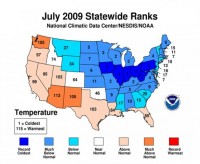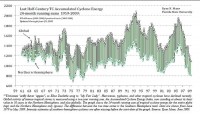Cobb County Conservative Examiner
Eighty prominent scientists, researchers and environmental business leaders - many of them physicists - have called on the American Physical Society (APS), the nation’s leading physics organization, to revise its policy statement on climate change. The century-old APS is the premier scholarly group in the U.S. dedicated to the advancement and dissemination of the knowledge of physics.
The signers of an open letter to the APS Council, the governing body of APS, are current and past members of APS. They disagree with the current APS policy statement on climate change, which contains such language as, “Emissions of greenhouse gases from human activities are changing the atmosphere in ways that affect the Earth’s climate,” and “The evidence is incontrovertible: Global warming is occurring.”
The group of 80 scientists and academic leaders is urging APS to revise its statement on climate change to read as follows:
Greenhouse gas emissions, such as carbon dioxide, methane, and nitrous oxide, accompany human industrial and agricultural activity. While substantial concern has been expressed that emissions may cause significant climate change, measured or reconstructed temperature records indicate that 20th [and] 21st century changes are neither exceptional nor persistent, and the historical and geological records show many periods warmer than today. In addition, there is an extensive scientific literature that examines beneficial effects of increased levels of carbon dioxide for both plants and animals.
Studies of a variety of natural processes, including ocean cycles and solar variability, indicate that they can account for variations in the Earth’s climate on the time scale of decades and centuries. Current climate models appear insufficiently reliable to properly account for natural and anthropogenic contributions to past climate change, much less project future climate.
The APS supports an objective scientific effort to understand the effects of all processes - natural and human - on the Earth’s climate and the biosphere’s response to climate change, and promotes technological options for meeting challenges of future climate changes, regardless of cause.
This is a far cry from what we are reading in the very unscientific mainstream media. As a matter of fact, it would be a great surprise if the major media even report the challenge of these courageous scientists to the APS status quo.
When asked for a comment on the open letter, APS Executive Officer Kate Kirby issued the following statement: “The APS president Cherry Murray has formed an ad hoc committee to examine the APS statement. The committee will advise Dr. Murray and the APS council on whether any changes to the statement are necessary.”
The current APS policy statement on climate change was issued in November 2007. But since then, a growing body of evidence has been emerging that challenges the facts and conclusions of the APS statement. It remains to be seen if APS will consider all of the available evidence and recent research. Much of this new information would be embarrassing to politicians, including the President of the United States, because it will show that global warming as a result of human activity is a myth.
The Administration and congressional leaders are in the heat of a legislative battle over health care, but they are also pushing a radical climate change or “cap-and-trade” bill that would dramatically increase the cost of energy for U.S. consumers and businesses. If APS reviews its statement in light of recent, more accurate research, its council may be inclined to adopt the revised statement on climate change from the open letter. But will APS leaders have the courage to do so in the face of intimidation by political leaders who don’t want to change their policies? It wouldn’t be the first time that political power trumped science.
This open letter is just one more piece of evidence that the theory of man-made global warming is losing credibility. Is anyone in Washington listening, or will misguided members of Congress enact their big-government “cap-and-trade (tax)” legislation without so much as a healthy debate about whether man-made global warming theory is even scientifically valid? See post here.
Also note in Bloomberg the story Democrats say Climate Change Legislation Should Be Set Aside. The U.S. Senate should abandon efforts to pass legislation curbing greenhouse-gas emissions this year and concentrate on a narrower bill to require use of renewable energy, four Democratic lawmakers say.
“The problem of doing both of them together is that it becomes too big of a lift,” Senator Blanche Lincoln of Arkansas said in an interview last week. “I see the cap-and-trade being a real problem.”
(Bloomberg)—Australia’s Senate rejected the government’s climate-change legislation, forcing Prime Minister Kevin Rudd to amend the bill or call an early election. Senators voted 42 to 30 against the law, which included plans for a carbon trading system similar to one used in Europe. Australia, the world’s biggest coal exporter, was proposing to reduce greenhouse gases by between 5 percent and 15 percent of 2000 levels in the next decade.
Rudd, who needs support from seven senators outside the government to pass laws through the upper house, can resubmit the bill after making amendments. A second rejection after a three-month span would give him a trigger to call an election.
“We may lose this fight, but this issue will not go away,” Climate Change Minister Penny Wong told the Senate in Canberra. “Australia cannot afford for climate change to be unfinished business.”
Five members from the Australian Greens party sought bigger cuts to emissions while the opposition coalition and independent Senator Nick Xenophon wanted to wait for further studies on the plan’s impact on the economy.
Australia’s rainfall is the lowest of the world’s continents, excluding Antarctica, according to the Web site of Melbourne Water, a water management authority owned by the Victorian state government. Years of drought have cut farm output and water supplies in the Murray Darling Basin, the nation’s biggest river system and home to almost half its farms.
Sydney Opera House
Lower rainfall, higher sea and land temperatures, severe storms, increased acidity in the ocean or rising sea levels could all threaten World Heritage sites such as the Sydney Opera House and the Great Barrier Reef, a report from the Australian National University said last week.
Rudd planned to pursue a steeper 25 percent emissions cut pending an international accord stabilizing carbon levels. His administration wants the legislation in place before a December meeting of 200 countries in Copenhagen to replace the Kyoto Protocol. China and the U.S., the world’s largest polluters, have yet to commit to targets for cutting greenhouse gases.
“This defeat doesn’t make any difference to our position in global negotiations and it doesn’t add to momentum for those discussions,” said Andrew Macintosh, an analyst from Australian National University’s Center of Law and Climate Policy. “Copenhagen will provide some impetus for further negotiations on Australian laws.”
Corporate Opposition
The Australian legislation faced opposition from some companies that said the planned cuts were too deep and would have damped economic growth without making much difference to global warming. Advocates of tougher measures to combat climate change said the plan didn’t go far enough. Royal Dutch Shell Plc’s Australian unit urged the government in May to revise the plan to avoid reducing the ability of local companies to compete internationally.
The U.S. House of Representatives approved legislation in June to limit heat-trapping pollution and create a trading system for pollution permits. The U.S. cap-and-trade bill must still pass the Senate.
The architects of Australia’s plan, approved by the lower house of parliament on June 4, sought to create an economic incentive to cut emissions by forcing heavy polluters to buy carbon credits. Emissions from Australia will grow to 120 percent of the 2000 level without a pollution reduction plan, Wong said earlier this month. “Australia going it alone before Copenhagen will not make a jot of difference,” Liberal Senator Eric Abetz said. “It is a dog of a plan and we will not support it in its current form.”
Bill Amendments
The government can resubmit legislation after negotiating with industry, Senators and conservationists. Parliament will hold three more two-week sessions this year starting on Sept. 7, Oct. 19 and Nov. 16. It then adjourns until 2010. “The government will consider any serious amendment,” Wong said. “We will press on for as long as we have to, we will bring this bill back before the end of the year.”
The Copenhagen accord aims to reach an agreement to slow greenhouse-gas emissions and shift the world to low-carbon energy sources. China and other developing nations reject calls for binding targets, arguing that rich nations fueled their growth while polluting for decades. Getting China, the world’s fastest- growing major economy, to commit to lowering emissions is a key goal for Copenhagen.
The global credit crisis, which has plunged most developed economies into recession, has blunted the fight to tackle climate change. Australia’s government has spent A$90 billion ($75 billion) on economic stimulus.
“Climate has slipped down the list of priorities for Australians and they won’t like going to an early poll on it,” Macintosh said. “Climate has gone on the backburner because of the economic climate we have found ourselves in.”
NOAA NEWS
The July 2009 temperature for the contiguous United States was below the long-term average, based on records going back to 1895, The July 2009 temperature for the contiguous United States was below the long-term average, based on records going back to 1895, according to a preliminary analysis by NOAA’s National Climatic Data Center in Asheville, N.C.

See larger image here.
The average July temperature of 73.5 degrees F was 0.8 degrees F below the 20th century average. Precipitation across the contiguous United States in July averaged 2.90 inches, which is 0.14 inches above the 1901-2000 average.
U.S. Temperature Highlights
An abnormally strong, persistent upper-level pattern produced more than 400 record low minimum temperatures and 1,300 record low maximum temperatures (lowest high temperature) across the nine-state area that make up the Central region.
Ohio, Iowa, Illinois, Indiana, West Virginia, and Pennsylvania experienced their coolest July on record. Kentucky, Missouri, Wisconsin, and Michigan each had their second coolest July on record, while Minnesota and Tennessee had their third coolest July on record.
Death Valley, Calif., set a new monthly average maximum temperature at 121.3 degrees F. Temperatures in Death Valley reached 120 degrees F or higher for 22 days, beating the old record of 19 days.
Several western locations recorded their all-time warmest July. Seattle-Tacoma Airport had an average July temperature of 69.5 degrees F, which was 4.2 degrees F above average. Seattle’s high temperature of 103 degrees F on July 29 is an all-time record. Alaska posted its second warmest July, Arizona had its third warmest, while New Mexico and Washington had their ninth warmest.
Based on NOAA’s Residential Energy Demand Temperature Index, the contiguous U.S. temperature-related energy demand was 13.3 percent below average in July. Much of this can be attributed to cooler-than-average conditions in the heavily-populated Northeast.

Upper level (500mb or around 18,000 feet anomalies of height. Blues are below normal heights and cold temperatures, red above normal heights and temperatures.
Despite the cold July see this piece on Planet Gore By Henry Payne.
Michigan just experienced its coldest July on record; global temperatures haven’t risen in more than a decade; Great Lakes water levels have resumed their 30-year cyclical rise (contrary to a decade of media scare stories that they were drying up due to global warming), and polls show that climate change doesn’t even make a list of Michigan voters’ top-ten concerns.
Yet in an interview with the Detroit News Monday, Senator Debbie Stabenow (D., Mich.) - recently appointed to the Senate Energy Committee - made clear that fighting the climate crisis is her top priority.
“Climate change is very real,” she confessed as she embraced cap and trade’s massive tax increase on Michigan industry - at the same time claiming, against all the evidence, that it would not lead to an increase in manufacturing costs or energy prices. “Global warming creates volatility. I feel it when I’m flying. The storms are more volatile. We are paying the price in more hurricanes and tornadoes.”
And there are sea monsters in Lake Michigan. I can feel them when I’m boating.
Icecap Note:

Tropical Cyclone Accumulated Cyclone Energy index from Ryan Maue showing hurricanes approaching a 30 year low. See larger image here.
The trend for violent tornadoes has been down since 1950 despite an increase in the reported number of storms due to better detection by spotters and doppler radar.


